If you’re a Democrat running for President, the stakes were high tonight. January’s Democratic presidential primary debate was the last one before the Iowa caucuses on Feb. 3, where voters start to weigh in on the race. Recent polling suggests there isn’t a clear front runner in Iowa yet, and many prospective caucus-goers are watching.
The stage was the smallest — and whitest — so far. Only six candidates qualified this time and none of them are people of color: former Vice President Joe Biden, former South Bend, Ind., Mayor Pete Buttigieg, Minnesota Sen. Amy Klobuchar, Vermont Sen. Bernie Sanders, billionaire executive Tom Steyer and Massachusetts Sen. Elizabeth Warren.
The DNC raised the debate qualifications since last month’s debate: candidates had until 11:59 p.m. on Jan. 10 to get at least 5% in four DNC-approved polls or at least 7% in two early-state polls (Iowa, New Hampshire, South Carolina and/or Nevada). They also needed at least 225,000 unique donors with a minimum of 1,000 unique donors in at least 20 states, U.S. territories or Washington D.C.
New Jersey Sen. Cory Booker and entrepreneur Andrew Yang — both people of color — each met the donor requirements but didn’t quite hit the polling threshold. Booker dropped out of the race on Monday. Former New York City Mayor Michael Bloomberg met the polling requirements but lacked the donor numbers; he’s pledged to self-fund his campaign and thus won’t qualify for any of the debates. The only Latino candidate in the field, former Secretary of Housing and Urban Development Julián Castro, dropped out of the race on Jan. 2 and endorsed Warren on Jan. 6.
The candidates stood on stage based on polling averages released in January, with the highest polling candidates — Biden and Sanders — standing in the middle. They stood in the following order from left to right: Steyer, Warren, Biden, Sanders, Buttigieg and Klobuchar.
The debate — co-hosted by CNN and The Des Moines Register at Drake University in Des Moines, Iowa — had three moderators: CNN political anchor Wolf Blitzer, CNN political correspondent Abby Phillip, and The Register‘s chief political correspondent Brianne Pfannenstiel.
Given recent developments — articles of impeachment are likely headed to the Senate, the state of U.S.-Iran relations, Australia’s raging bushfires, and tensions within the Democratic field — there was plenty to talk about.
“We’re down to the end here. That means there’s pressure on everybody to try to show off, to be smart, to point out their opponents’ weaknesses,” Stuart Rothenberg, a political analyst and senior editor of Inside Elections with Nathan Gonzales, tells TIME. “But you don’t want to go too nasty right at the end here. You don’t want to look mean spirited. That’s not Midwestern nice.”
These are the biggest highlights from the January Democratic Debate in Iowa.
‘I was the only one who has defeated an incumbent Republican in 30 years’
Warren showed more willingness to push back against her longtime friend and fellow progressive Sanders on Tuesday than in previous debates. Pundits speculated that there could be a shift in the dynamic between the pair during Tuesday’s debate, especially after a report emerged the previous day that Sanders told Warren in a private 2018 meeting that he felt a woman could not win a Presidential election. Warren later confirmed the report, while Sanders strongly denied it.
During the debate, Sanders doubled down on that denial — and said that he had never told her a woman couldn’t win. He further said that he has consistently supported the idea of a female president for the past 30-plus years.
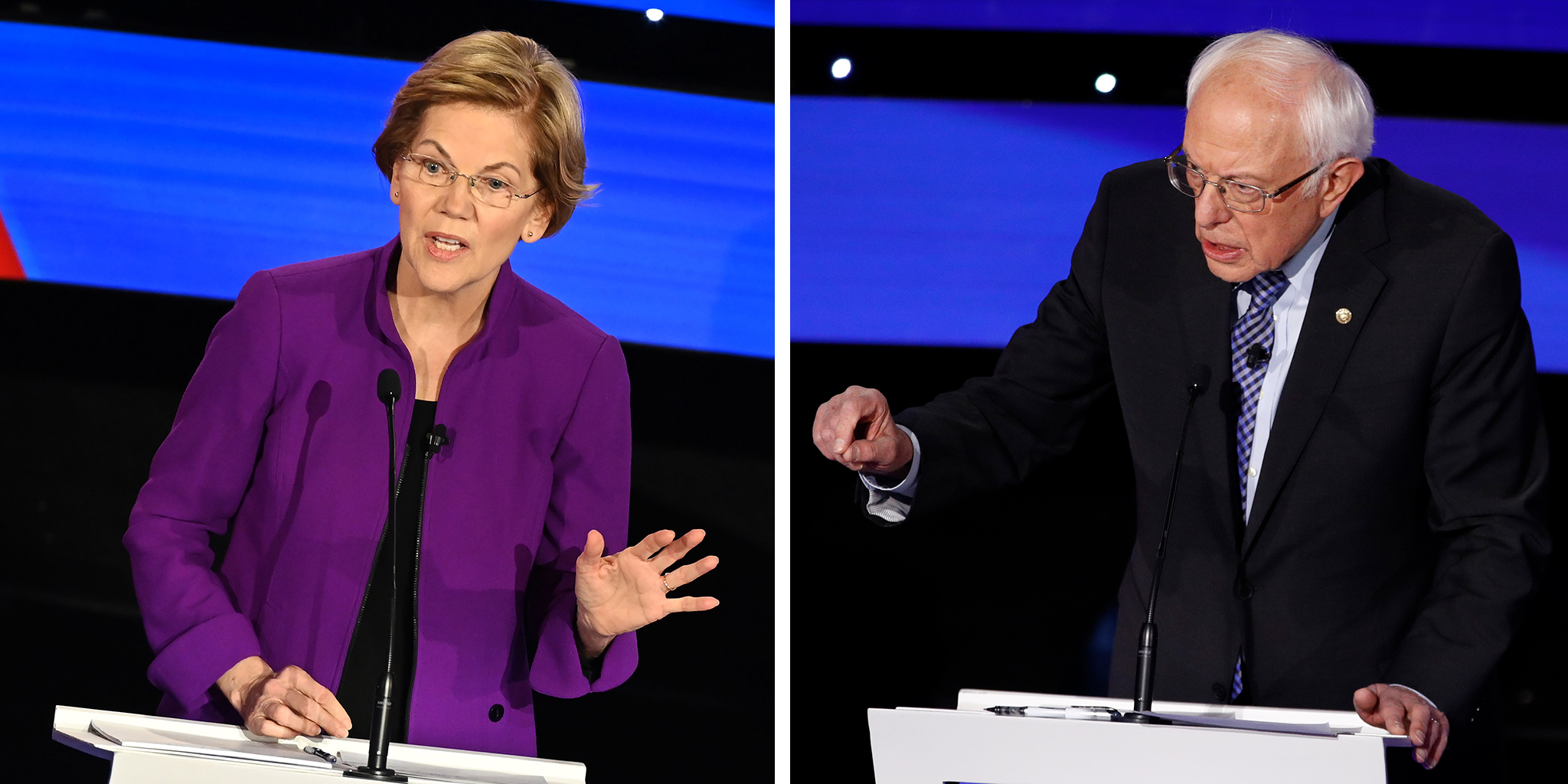
Moderator Abby Phillip pushed back on his response, asking Warren, “What did you think when Senator Sanders told you a woman could not win the election?”
“I disagreed,” said Warren, pointing out that unlike the men on the stage at the debate, both she and Klobuchar have won all the elections they competed in. She also cautioned voters to choose a candidate with broad appeal – indirectly contrasting herself with Sanders, whom some have argued is too far left to appeal to moderates.
“The only person on this stage who has beaten an incumbent Republican any time in the last 30 years is me,” Warren also said. “And here’s what I know – the real danger that we face as Democrats is picking a candidate who can’t bring our party together. Or someone who takes for granted big parts of the Democratic constituency.”
After Sanders pushed back, arguing that he had in fact defeated a Republican candidate in 1990, Warren jabbed, “And I said—I was the only one who has defeated an incumbent Republican in 30 years.”
Warren and Sanders share an awkward post-debate moment
Just after the debate ended, CNN cameras caught an awkward moment between Warren and Sanders that quickly went viral. As the candidates thanked each other before exiting the stage, Warren walked up to Sanders who had his hand outstretched.
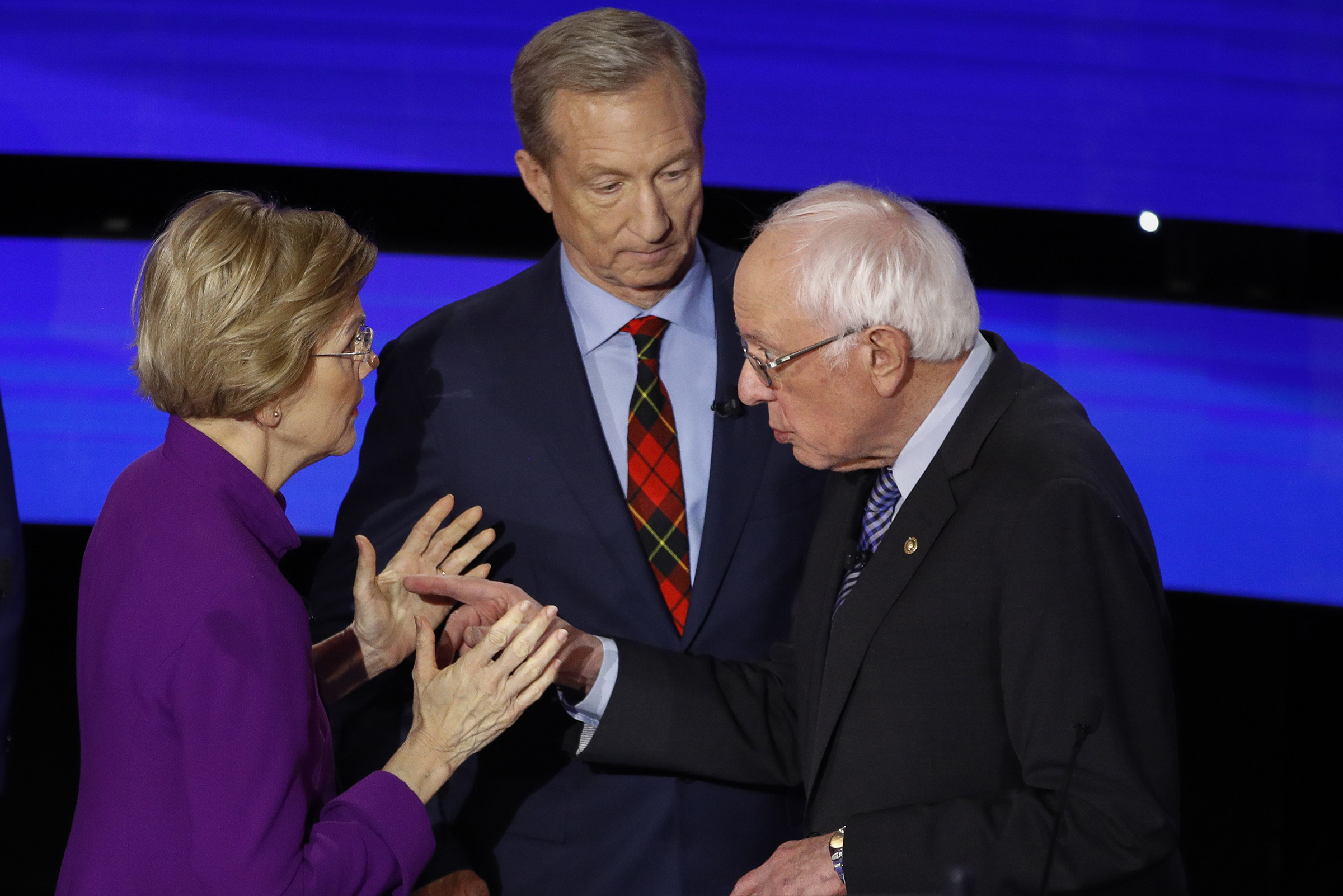
Warren, however, declined to take his hand and instead spoke with him during what appeared to be a tense exchange.
Things got even more awkward when Tom Steyer walked up to the two candidates, who ignored him and continued their intense discussion as he looked on. The moment ended with Sanders pointing at Warren and walking away, finally taking Steyer’s hand and shaking it.
Speaking to MSNBC’s Chris Matthews after he left the stage, Steyer said that he didn’t know what they were saying, adding he was “was trying to get out of the way as fast as possible.”
Candidates weigh in on impeachment
With the debate taking place just one day before the House is set to vote on sending the articles of impeachment to the Senate, the candidates were asked to address whether it would be more challenging to defeat Trump if the President were acquitted in a Senate impeachment trial.
Biden said the Senate’s decision is “irrelevant,” and that impeachment is necessary even if the Senate does not vote to remove Trump from office. “There’s no choice but for Nancy Pelosi and the House to move. He has, in fact, committed impeachable offenses,” Biden said.
Klobuchar, who would serve as a juror in the Senate trial, agreed that the impeachment trial and the election are a “decency check” for the U.S. government and that there is a “constitutional duty” to impeach Trump. She warned that if Republicans don’t allow the four witnesses Democrats have requested to testify at the trial, it would undermine the democratic process.”
“If our Republican colleagues won’t allow those witnesses, they may as well give the President a crown and a scepter. They may as well make him king,” Klobuchar said.
Buttigieg also said that the President’s conduct was “impeachable” and that voters should choose a candidate who can provide unity at the conclusion of his Administration. “We are absolutely going to confront the President for his wrongdoing, but we are also each running to be the President who will lead this country after the Trump presidency comes to an end one way or the other,” he said.
Candidates commit to universal child care
Pfannenstiel asked Buttigieg a question from an Iowa Democratic voter: how would he prioritize “accessing quality affordable child care in your first 100 days in office?”
“It makes no sense for child care to cost two thirds of somebody’s income,” the former mayor responded, saying he would work to drive those costs down. “We shouldn’t be afraid to put federal dollars into making that a reality.”
Pfannenstiel then asked Warren why her child care plan includes an income limit on free child care. Warren responded that her plan includes “universal child care for everyone, it just has some people adding a small payment.”
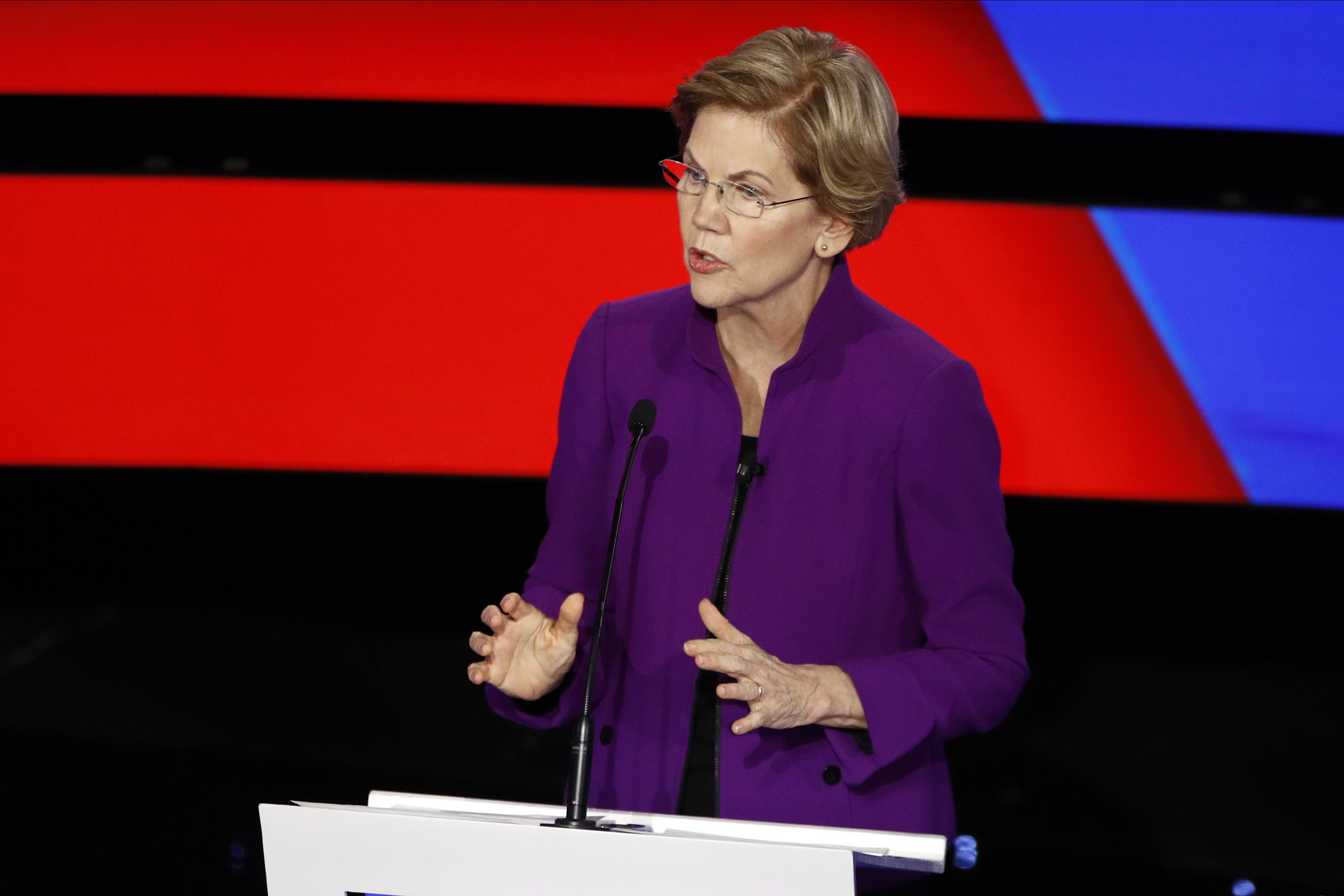
Warren added that “she’s been there.” She shared that if her aunt didn’t help her with child care when, as a single mom, she first began her career, she said she would have quit her job. Warren argued that her “two cents wealth tax” will provide child care for everyone in the U.S. and will help stop exploiting women of color who do much of the child care work in the U.S.
Sanders agreed with Warren that the nation’s approach to child care needs major changes, arguing it is an “embarrassment.” Biden said that he also supports free universal infant care, adding that he knows what it’s like to be a single working parent. Biden became a single father when his wife and his daughter died in a car accident shortly after he was elected to the Senate in the 1970s.
Candidates spar on the United States–Mexico–Canada Agreement
Pfannenstiel asked the candidates about an issue that impacts many Iowans: the U.S.’s many trade deals. On Wednesday, President Trump is set to sign phase one of a new agreement with China, and the Senate is poised to approve the United States–Mexico–Canada Agreement (USMCA), often referred to as the “new NAFTA.” The candidates split on their support for their new agreement, but nearly all spoke out against previous trade deals that they believe put the profits of multinational corporations above those of average Americans.
Pfannenstiel specifically asked Sanders why he’s announced he will not vote for the USMCA, despite the fact that it could provide some relief to farmers in Iowa and has been endorsed by the AFL-CIO. Sanders replied that the deal made “some modest improvements” but he plans to vote against it because it does not stem the outsourcing of well paying jobs and does not center the threat of climate change. He added that the Machinist Union and every major environmentalist group — including the Sunrise Movement that recently endorsed him — has opposed the deal.
“I will not vote for a trade agreement that does not incorporate very, very strong principles to significantly lower fossil fuel emissions in the world,” he said. Sanders added that he voted against NAFTA and normal trade relations with China.
Warren, on the other hand, said she will vote for the deal because it will provide some relief for workers. “It will give some relief to our farmers, it will give some relief to our workers. I believe we accept that relief, we try to help the people who need help, and we get up the next day and fight for a better trade deal,” she said. Sanders responded that “it is not so easy to put together new trade legislation. If this is passed, I think it will set us back a number of years.” Sen. Amy Klobuchar said she would also vote for the USMCA, arguing that it would not only help American farmers but also that the U.S. needs “a big trading block with North America to take on China.”
Buttigieg said he also supports the USMCA, saying “Yes it has been improved, it is not perfect.”
Biden, who voted for NAFTA, said that under his administration climate activists and workers would be at the table when future trade deals are cut. Biden, who supports USMCA, added that “I don’t know if there’s any trade agreement that [Sanders] would think made any sense.” Sanders then turned to Biden and said, “Joe and I have a fundamental disagreement here in case you haven’t noticed.” Sanders then argued that previous trade deals, which Biden voted and advocated for, were written “to increase the profits of large multinational corporations,” adding that “we need some corporate responsibility here.” Biden responded that “we need corporate responsibility” but trade deals need enforcement mechanisms, which USMCA defenders say the new trade provides, at least to an extent. Steyer, who founded a climate non-profit, added that he like Sanders opposes the USMCA because it doesn’t center on climate change, which he says is his number-one priority. He argued that because climate change is so crucial he cannot support the deal, even though it may give American workers some relief.
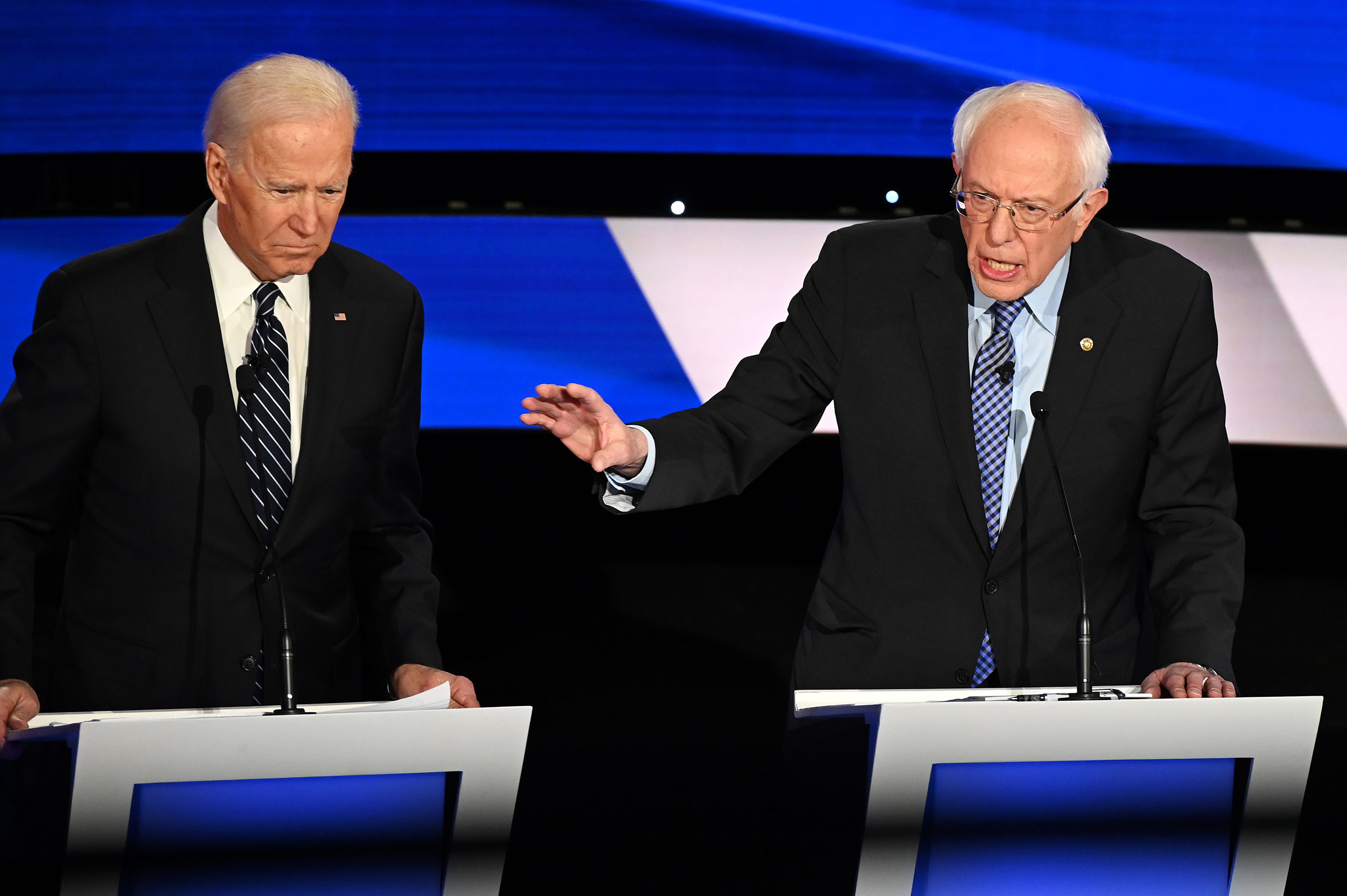
Biden and Steyer said they would not sit down with North Korea without “preconditions”
Biden and Steyer said they would not meet with North Korean leader Kim Jong Un without “any preconditions,” as President Donald Trump has done.
Despite the fact that Obama once said he would meet with the North Korean leader “without any preconditions,” Biden said he wouldn’t meet with him now.
“We gave him everything he’s looking for… the President showed up, met with him, gave him legitimacy. Weakened the sanctions we have against him,” Biden said. He explained that he would work towards better relations between Japan and South Korea, as well as put “enormous” pressure on China because it’s “also in their interest for them to put pressure on North Korea to cease and desist.”
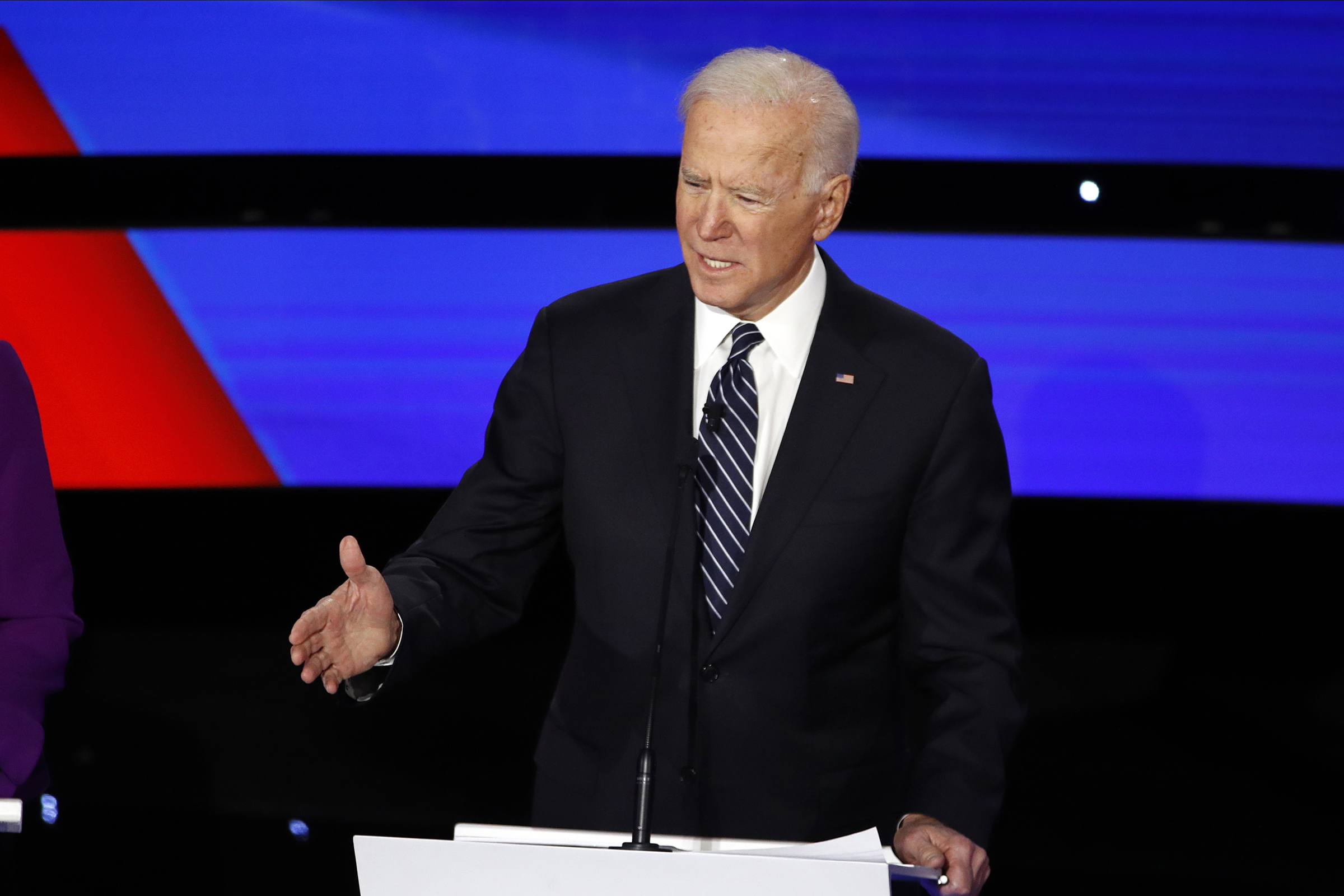
Biden then added that no, he would not meet with the North Korean leader who once said “Joe Biden is a rabid dog, he should be beaten to death with a stick.”
Steyer agreed, saying he wouldn’t meet with the North Koreans without preconditions because it’s “not going anywhere.”
“It’s very clear that if we’re going to do something with North Korea, we’re going to have to do it in concert with our allies,” he said. “This is a classic situation where the United States’ idea of going it alone makes no sense.”
Sanders slams Biden over Iraq vote
With the debate opening one week after a face off between the U.S. and Iran stoked fears of a prolonged military conflict, the moderators opened the debate by asking the candidates why they would make the best commander in chief.
Sanders quickly drew attention to Biden’s 2002 vote to give the President the authority to use force in Iraq. Sanders described the decision to go to war in Iraq as the “worst foreign policy blunder in the modern history of this country.”
“I did everything I could to prevent that war. Joe saw it differently,” Sanders said.
Biden conceded that it was “a mistake” to give the President the authority to go to war in Iraq, and asserted that he changed his mind about the war soon after his vote. He also noted that he was later charged by President Obama with ending the war in Afghanistan.
“We should not send anyone anywhere unless the overwhelming vital interests of the United States are at stake. They were not at stake there, they were not at stake in Iraq, and it was a mistaken vote,” said Biden.
Klobuchar, Buttigieg and Warren also made the case that they are each best prepared to be the commander in chief of the United States, describing how their backgrounds prepared them for the role. Buttigieg pointed to his own service in the military, while Warren and Klobuchar referred to their time as Senators.
More Must-Reads from TIME
- Donald Trump Is TIME's 2024 Person of the Year
- Why We Chose Trump as Person of the Year
- Is Intermittent Fasting Good or Bad for You?
- The 100 Must-Read Books of 2024
- The 20 Best Christmas TV Episodes
- Column: If Optimism Feels Ridiculous Now, Try Hope
- The Future of Climate Action Is Trade Policy
- Merle Bombardieri Is Helping People Make the Baby Decision
Write to Madeleine Carlisle at madeleine.carlisle@time.com
